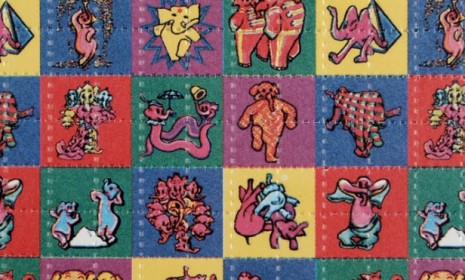Should we use LSD to treat alcoholism?
A new look at the old practice of giving LSD to alcoholics suggests the trippy treatment deserves a second chance

A free daily email with the biggest news stories of the day – and the best features from TheWeek.com
You are now subscribed
Your newsletter sign-up was successful
It's time to take the idea of treating alcoholism with acid trips seriously, researchers from the Norwegian University of Science and Technology argue in the Journal of Psychopharmacology. Neuroscientist Teri Krebs and clinical psychologist Pål-Ørjan Johansen looked at what happened when more than 500 alcoholics were given LSD as part of their treatment, and "we were surprised that the effect was so clear and consistent," says Krebs. Is dropping acid really the answer to compulsive drinking? Here's what you should know:
Did these scientists give acid to alcoholics?
No. LSD (lysergic acid diethylamide) is illegal. Instead, Krebs and Johansen dug into studies conducted in the U.S. and Canada between 1966 and 1970, when LSD was still legal and considered a promising treatment for a host of problems. The scientists pooled the results of six small, randomized, double-blind studies, creating a sample of 536 alcoholics treated with either a single dose of acid or a placebo.
The Week
Escape your echo chamber. Get the facts behind the news, plus analysis from multiple perspectives.

Sign up for The Week's Free Newsletters
From our morning news briefing to a weekly Good News Newsletter, get the best of The Week delivered directly to your inbox.
From our morning news briefing to a weekly Good News Newsletter, get the best of The Week delivered directly to your inbox.
What did they find?
Of the 325 alcoholics given a full does of LSD — 210 to 800 micrograms — 59 percent showed clear improvement, including lower incidents of relapse and higher rates of staying dry. For the other group, which got either a placebo or lower dose of acid — 25 or 50 micrograms — only 38 percent showed notable improvement. Surprisingly, the sobering effect of the LSD lasted for at least six months before fading, suggesting that regular doses might effectively cure alcoholism. "Given the evidence for a beneficial effect of LSD on alcoholism, it is puzzling why this treatment approach has been largely overlooked," the researchers say.
How does acid cure alcoholism?
"We do not yet fully know why LSD works this way," say Krebs and Johansen, but it "generally seems to open an individual to an awareness of new perspectives and opportunities for action." Maybe, Robin Carhart-Harris at Imperial College London tells Nature, LSD and other psychedelic drugs "work in addiction by making the brain function more chaotically for a period — a bit like shaking up a snow globe — weakening reinforced brain connections and dynamics."
A free daily email with the biggest news stories of the day – and the best features from TheWeek.com
So why not use it?
Aside from the legal issues, LSD can have some nasty side effects: Bad trips that put the user in danger, recurring flashbacks, intense anxiety or panic, or even symptoms of paranoia and schizophrenia. Besides, no drug is a silver bullet for alcoholism, addiction psychiatrist Ken Checinski tells Nature, and all these LSD trials predate potentially more effective "psychological techniques such as motivational interviewing and cognitive behavior therapy."
Is it worth studying this further?
Absolutely, says Johansen. "Alcoholism is serious and often deadly. We need new treatment options." And when it comes to treating alcoholism, "this is probably as good as anything we've got," former British government drug adviser David Nutt tells BBC News. But it will be hard to get past the "baggage of illegality and biases," addiction psychiatrist Richard Ries tells MyHealthNewsDaily. Though as part of a larger treatment regime, LSD could be a godsend. "Look at heroin addiction — we use methadone, another type of opiate, and give it to people to prevent them from overdosing."
Sources: BBC, CBS News, MSNBC/MyHealthNewsDaily, Nature, Norwegian University of Science and Technology
-
 Corruption: The spy sheikh and the president
Corruption: The spy sheikh and the presidentFeature Trump is at the center of another scandal
-
 Putin’s shadow war
Putin’s shadow warFeature The Kremlin is waging a campaign of sabotage and subversion against Ukraine’s allies in the West
-
 Media: Why did Bezos gut ‘The Washington Post’?
Media: Why did Bezos gut ‘The Washington Post’?Feature Possibilities include to curry favor with Trump or to try to end financial losses